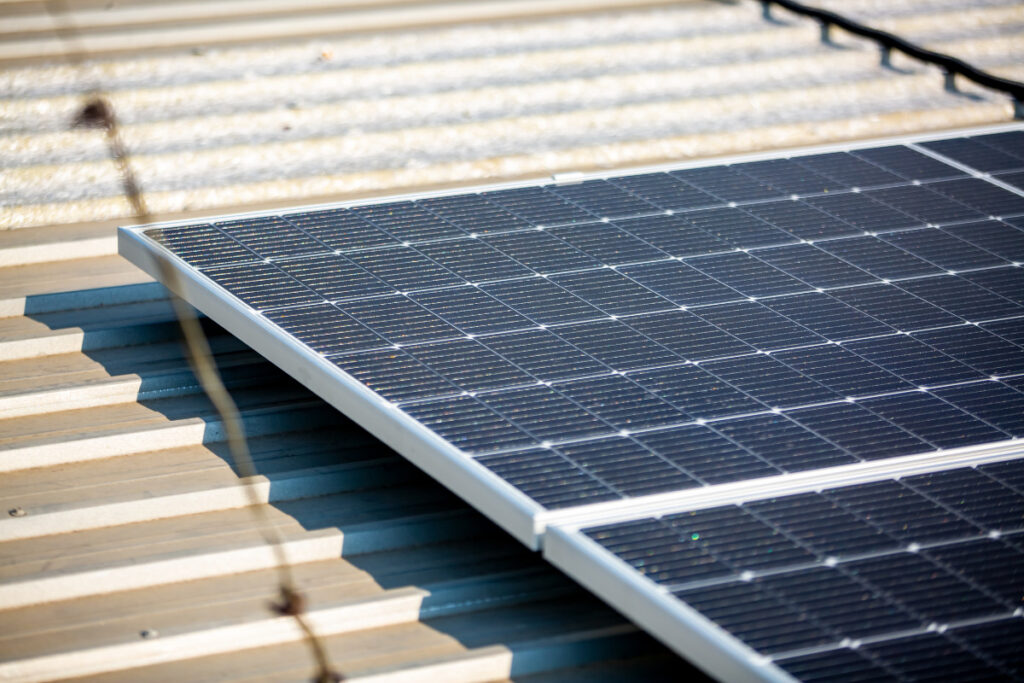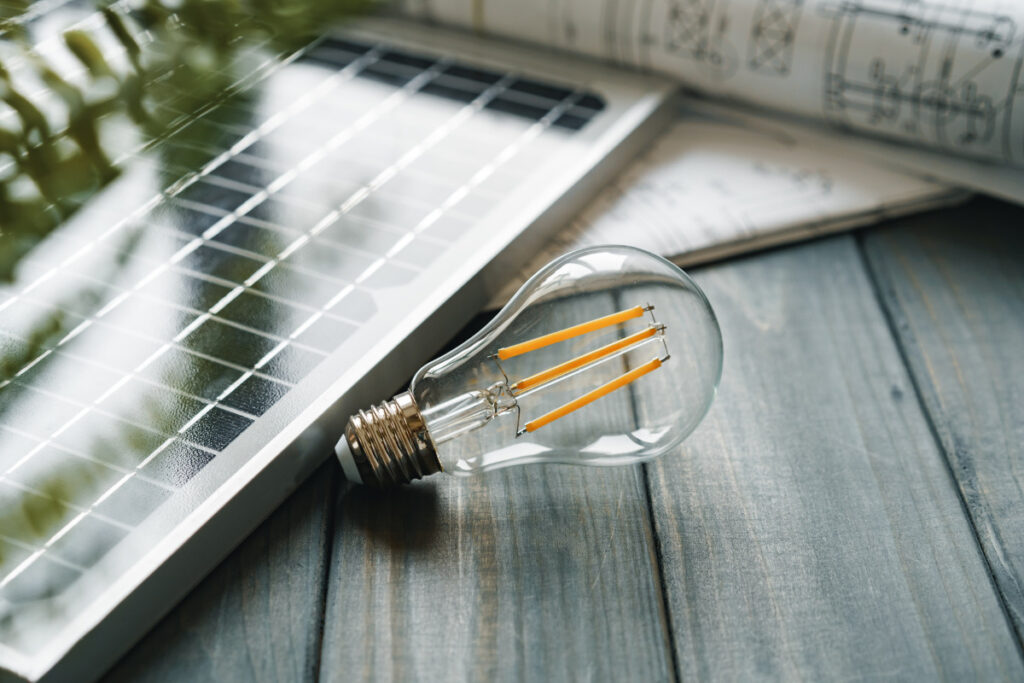Introduction
Harnessing renewable energy has never been more accessible and affordable, making solar panels an increasingly popular choice for homeowners in Idaho.
Before taking the plunge, understanding the ins and outs of installing solar panels with Idaho Power is essential. This comprehensive guide will walk you through every step of the process – from understanding the benefits of going solar to maximizing your return on investment.
We’ll also discuss available incentives, tax credits, net metering policies, and how to choose a reliable installer that meets your needs.
| Key Takeaways |
|---|
| Idaho has great potential for solar energy due to its high levels of sunlight, and homeowners can benefit from reduced electricity bills and environmental sustainability by switching to renewable energy. |
| Understanding the factors that affect the cost of solar in Idaho, such as size of the system, type of panels, roof complexity, location, incentives and tax credits can help homeowners make an informed decision about whether it's a worthwhile investment for their home or business. |
| Idaho offers a variety of solar incentives and tax credits including net metering, Solar Power Purchase Agreements (PPA), federal tax credits and Idaho Energy Loans to help offset the cost. These options make renewable energy sources more accessible or affordable. |
Understanding Solar Power And Its Benefits In Idaho
Idaho boasts great solar energy potential with high sunlight levels. Homeowners can benefit from reduced electricity bills and environmental sustainability by transitioning to renewable energy.
Exploring Idaho’s Solar Potential
Idaho’s solar potential is an untapped treasure that more and more residents are beginning to recognize. The state ranks among the top in the nation for its solar resource potential, with over 200 sunny days per year on average.
The Idaho Power Company (IPC), which serves most parts of Idaho, plays a significant role in promoting the use of solar panels within its service area. As part of their long-term commitment to sustainable energy solutions, IPC aims to increase customer-generated electricity from rooftop photovoltaic (PV) cells by performing studies such as IPC-E-21-21 Solar Study.
As more people become aware of Idaho’s rich solar resources and begin installing PV systems at home or workplaces, it benefits them financially. It contributes toward building a greener future for generations to come.
Factors That Affect The Cost Of Solar
The cost of solar panels varies depending on several factors. Here are some of the critical factors that affect the price of solar in Idaho:
- Size of your solar panel system: Larger systems will cost more upfront, requiring more panels and installation time.
- Type of solar panels: Different panels have varying efficiency ratings and prices. Higher-efficiency panels will generally be more expensive.
- Roof complexity: Roofs with complex angles or materials may require additional labor or equipment, which can increase installation costs.
- Location: Your location affects your access to sunlight and local installation costs, so solar power costs differ for everyone.
- Solar incentives and tax credits: Idaho’s net metering program, federal tax incentives, and other programs can reduce the upfront cost of a solar panel system.
- Energy usage: The amount of energy you use impacts the size of the system needed to meet your needs and therefore affects your overall costs.
Consider these factors when evaluating a solar panel system to determine its worth as an investment for your home or business in Idaho.

Discussing The Benefits Of Solar Energy
Switching to solar energy has many benefits for homeowners in Idaho. One of the most significant advantages is savings on monthly power bills. As traditional electricity costs continue to rise, investing in solar panels can lead to long-term savings.
Another benefit of solar energy is its reliability during power outages or emergencies. Homeowners with a solar panel system installed can continue to generate their own electricity even when the grid goes down.
With Idaho’s state tax credit for 40% of the entire solar panel system expense, switching to renewable energy sources has never been more accessible or affordable.
Idaho’s Solar Incentives And Tax Credits
In Idaho, various solar incentives and tax credits are available. These include net metering, Solar Power Purchase Agreements, federal tax credits, and Idaho Energy Loans.
Net Metering
Net metering is a billing arrangement that credits solar panel owners for the excess electricity their system generates and sends back to the grid.
In Idaho, homeowners can earn credits for any extra power their panels produce during peak hours.
Imagine your solar panel system generates 10 kilowatts, but you only use 5 kilowatts. You receive credits for the excess 5 kilowatts, which carry over for future months when you require more electricity than your panels produce.
Solar Power Purchase Agreements
One financing option for homeowners interested in installing solar panels is the solar power purchase agreement (PPA). With a PPA, a third-party provider installs and owns the solar panels on your property.
You pay them for the electricity those panels generate at a fixed rate, often lower than standard utility rates.
PPAs are popular in states like Idaho because they allow residents to take advantage of state incentives without buying their own equipment. For example, the Idaho Energy Loan Program offers low-interest loans for home energy upgrades, including solar power systems installed through PPAs.
Federal Tax Credits
The federal government offers tax credits for installing solar panels, which can help reduce the overall cost of the system. For example, homeowners can claim a 26% credit on their federal income taxes for the total cost of their solar panel system.
This significant incentive has made solar power more accessible to many Americans.
To qualify for this credit, however, you must own your solar panel system and not lease it from a third party. Additionally, the credit will start phasing out soon and drop to 22 percent in 2023 before ending entirely at the end of that year unless Congress extends it again.
Idaho Energy Loans
Idaho Energy Loans are an excellent option for homeowners who want to invest in solar power but cannot afford the upfront cost. These loans can help reduce the financial burden by providing low-interest financing for energy-efficient home upgrades, including solar panel installation.
By taking advantage of these loans, you can generate electricity while enjoying significant savings on your monthly bills. Plus, with Idaho’s tax incentives and net metering programs, you can earn credits for any excess power generated and sell it back to the grid.

The Process Of Installing Solar Panels With Idaho Power
Learn how to install solar panels step-by-step with Idaho Power. Find the right solar installer, and understand the role of Idaho Power in the process.
Step-by-Step Guide To Installing Solar Panels
Installing solar panels can seem daunting, but it’s a manageable project with the right guidance and resources. Here is a step-by-step guide to installing solar panels with Idaho Power:
- First, assess your home’s energy needs: Before considering solar panels, understand how much energy your home requires regularly. This information will determine the size and number of solar panels you need.
- Determine your budget: Solar power systems can be expensive, so it’s important to establish your budget upfront. There are financing options available through Idaho Power to help offset costs.
- Find a reputable solar installer: Look for an experienced and licensed solar panel installer with good reviews from previous customers.
- Schedule an assessment: The installer will visit your home to evaluate its sun exposure and roof condition to determine if it is suitable for solar panel installation.
- Obtain necessary permits: Once the assessment is complete, obtain any necessary permits from local or state authorities before installation.
- Order equipment: Your installer will order all the necessary equipment for installation, including solar panels and inverters.
- Installation day: The installers will arrive at your home on the scheduled day to install all equipment safely and efficiently.
- Electrical work and inspections: After installation, electricians will connect all system components and perform safety inspections to ensure everything is working correctly.
- Final inspection from utility company: Once all work has been completed, Idaho Power will conduct a final inspection before approving the interconnection of your system to their grid.
Install efficient solar panels that meet your needs by following these steps and working with Idaho Power-approved professionals. This reduces your carbon footprint and monthly electricity bills.
Finding The Right Solar Installer With Idaho Power
Choosing the right solar installer is crucial in ensuring your solar panels are installed correctly and efficiently. With Idaho Power, finding the right installer is made easier through their list of preferred solar installers.
Idaho Power has carefully selected these contractors based on their expertise, customer service, and adherence to safety standards.
Collaborate with an experienced contractor for valuable insights on selecting the right panel type. They’ll also assist in maximizing financial incentives, like net metering and tax credits while meeting state regulations.
Understanding The Role Of Idaho Power In The Process
Idaho Power is a key player in the solar panel installation process. As the leading utility company for Idaho, they offer a range of services to help homeowners go solar. One important role they play is providing net metering, which allows you to earn credits for any excess energy your system generates and send it back to the grid.
Another way Idaho Power helps with solar panel installations is by connecting customers with trusted installers in their area. They have a list of approved contractors experienced in designing and installing systems that meet local regulations and codes.
Finally, Idaho Power offers advice on how to maximize your system’s performance and savings over time. They provide resources and tips on monitoring energy production, maintaining panels, and making small changes around your home to further reduce electricity usage.
Overall, partnering with Idaho Power is an essential part of installing solar panels successfully in Idaho. Their expertise as a utility company helps take some of the guesswork out of choosing equipment and finding reputable installers while also providing ongoing support after installation.
Maximizing Your Solar Panel System With Idaho Power
Discover how to properly monitor energy production, maximize energy generation and savings, and achieve peak performance with your solar panel system by partnering with Idaho Power.
Monitoring Energy Production With Idaho Power
After installing solar panels with Idaho Power, monitoring energy production to ensure maximum savings is important. Fortunately, Idaho Power provides various tools and resources to help customers do that.
One such tool is their online monitoring platform, allowing homeowners to track their solar energy production in real-time.
In addition, Idaho Power offers personalized energy coaching services where customers can get expert advice on utilizing their solar panel system for optimal efficiency.
These coaches can offer tips on everything from when to run certain appliances to how often the panels need cleaning for peak performance.

Maximizing Energy Generation And Savings
To make the most out of your solar panel system in Idaho, there are specific steps you can take to maximize your energy generation and savings. Here are some tips:
- Implement energy-efficient practices at home: Before installing a solar panel system, ensure your home is energy-efficient. This means providing proper insulation, efficient appliances, and low-energy lighting to reduce energy consumption.
- Optimize the placement of your solar panels: The placement of your solar panels can have a significant impact on their efficiency and energy generation. Ensure they are positioned to maximize exposure to sunlight throughout the day.
- Monitor energy production with Idaho Power: Idaho Power offers an online portal to monitor your solar panel system’s electricity production in real-time. Use this tool to track performance and identify areas for improvement.
- Maintain and clean your solar panel system regularly: Regular maintenance and cleaning can help improve its efficiency and prolong its lifespan. Be sure to keep them free from debris and dirt buildup.
- Utilize net metering: Take advantage of Idaho’s net metering program by selling any excess electricity generated by your solar panel system back to the grid for credits on future bills.
By implementing these strategies, you can maximize the effectiveness of your solar panel system in generating clean energy while providing cost savings over time.
Maintenance Tips And Best Practices
Maintaining your solar panel system is essential in ensuring it runs efficiently and effectively. Here are some tips and best practices to help you maximize the performance of your system:
- Clean your solar panels regularly to remove any dust, dirt, or debris that may accumulate on them. This can be done with a hose or by using a soft-bristled brush.
- Check for shading on your solar panels from trees or other objects that may obstruct sunlight from reaching them. If shading is present, consider trimming back trees or relocating the panels to a better location.
- Inspect your inverter regularly to ensure that it’s functioning correctly. The inverter converts DC electricity from solar panels into AC electricity for your home.
- Monitor your energy production regularly to track the performance of your system and identify any issues that may arise.
- Ensure optimal system performance and catch minor issues early by scheduling regular maintenance checks with a qualified technician.
Follow these maintenance tips to maximize your solar panel system’s efficiency and energy savings. Idaho Power provides resources and support for solar panel owners, so reach out for assistance when needed.
Conclusion
Congratulations! You are now equipped with a comprehensive guide to installing solar panels with Idaho Power. Explore Idaho’s solar potential. Understand the benefits of renewable energy to determine if solar panels are worth it for your home.
With Idaho’s generous state tax credit, federal incentives, and net metering program, you can save money on monthly power bills and contribute to a more sustainable future.
When considering a solar installation, remember to find the right installer with Idaho Power. Monitor energy production, maximize savings, and practice proper maintenance.
![]()
Ready to go solar?
Are you ready to embrace sustainable living and take the next step forward? DroneQuote is your trusted companion, offering assistance throughout the installation to ensure a seamless transition to solar energy. Our team of experienced professionals specializes in solar and roofing services, delivering top-notch installations tailored to your specific requirements.
By signing up today, you can schedule a consultation and uncover how we can help you harness the potential of solar energy. With our support, you’ll begin saving money, reducing your carbon footprint, and reaping the rewards of clean, renewable energy. Let’s create a brighter and greener future together, making a tangible difference.

FAQs
- What steps are involved in installing solar panels with Idaho Power?
Homeowners participating in Idaho Power’s renewable energy programs receive rebates and financial incentives. These incentives offset installation costs and contribute to a cleaner environment. Furthermore, renewable energy sources can lower monthly electricity bills in the long run.
- Can I install solar panels on my own without professional assistance?
Installing solar panels yourself is technically feasible but complex, requiring specialized knowledge of electrical systems and local building codes. It is usually recommended that customers work with a qualified contractor who has experience working with Idaho Power’s regulations.
- How does interconnection work when installing solar panels?
Interconnection refers to connecting your new solar panel system to the existing power grid maintained by Idaho Power. This typically involves submitting an application and obtaining approval from the utility company before installation.
- What are some benefits of installing solar panels through Idaho Power’s programs?
Homeowners can receive rebates and financial incentives by participating in Idaho Power’s renewable energy programs. This offsets installation costs while contributing to a cleaner environment. Moreover, renewable energy sources can lower monthly electricity bills over time.
